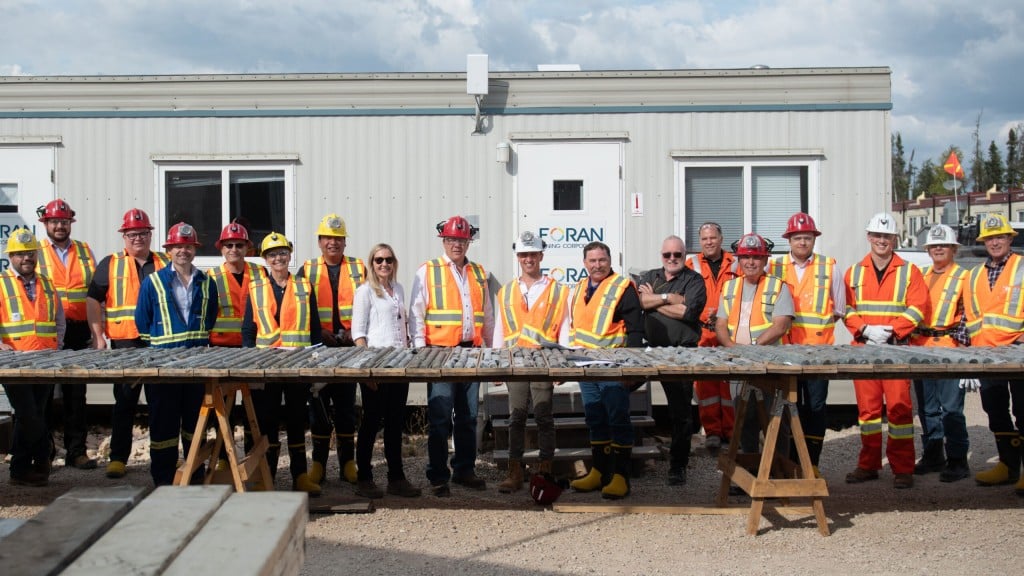CMIF invests $30 million in two Canadian critical mineral infrastructure projects
The funding will help build a road and new port facilities in Quebec and Labrador, and to electrify copper mine operations in Saskatchewan

Canada's minister of energy and natural resources Jonathan Wilkinson has revealed plans for the government to support critical mineral infrastructure projects with up to $30 million in funding. Ten million dollars will go to Torngat Metals for its Strange Lake Northern Transportation Infrastructure Project in Quebec and Labrador, and $20 million will go toward the construction of a hydro transmission line for Foran Mining's McIlvenna Bay copper mine project in Saskatchewan.
Natural Resources Canada is providing this conditional funding through the Critical Minerals Infrastructure Fund (CMIF)'s pre-construction stream. The CMIF is a key program under the Canadian Critical Minerals Strategy to address infrastructure gaps, enable critical minerals production, and connect resources to markets through various clean energy, electrification, and transportation infrastructure projects.
Connecting rare earth elements from the mine to processing facilities
Torngat Metals will use the funds to undertake pre-development activities related to the construction of a 170-kilometre road northern Quebec and Labrador and new port facilities on the coast of Labrador. These activities will include engagement with Indigenous communities, environmental reviews, and other planning and design work. This new access road will allow rare earth elements (REEs) mined in Nunavik, Quebec, to reach new port facilities in Labrador for shipping to separation and processing facilities.
These infrastructure improvements will serve Torngat Metals' Strange Lake Rare Earth Project, with its globally significant quantities of heavy and light rare earths — namely dysprosium, neodymium, praseodymium, and terbium — and help establish Canada as a leader in rare earths production and separation. REEs are necessary components in diverse industrial and high-technology applications, including electronics, clean energy, aerospace, automotive, and defence.
From everyday technologies like cellphones and computer hard drives, to defence applications like electronic displays, radar, and sonar systems, REEs play a critical role in national security, clean energy, and economic growth. Through this project, Canada can become a global supply chain leader in rare earth elements at a time where there is a critical shortage of heavy rare earth elements outside China, says the ministry of energy and natural resources.
"This investment in critical minerals infrastructure is vital for improving access to rare earth elements mined in northern Quebec," says Anita Anand, president of the Treasury Board and minister of transport. "We're supporting projects that will increase clean energy production and grow our economy."
Electrifying copper mine operations in Saskatchewan
Wilkinson also conditionally approved a CMIF investment of up to $20 million that will enable the construction of a hydro transmission line to connect to clean hydroelectricity, an on-site substation, and electrical vehicle charging infrastructure at Foran's McIlvenna Bay mine project, with the goal of fully electrifying the mine. This infrastructure will support carbon-neutral copper production, and Saskatchewan's position as a premier mining jurisdiction.
"We are proud to advance the McIlvenna Bay project with the support of the Government of Canada," says Dan Myerson, CEO and executive chairman of Foran. "The investment in developing a hydro transmission line and supporting infrastructure will deliver renewable hydropower to our operations and open up a new critical minerals and mining district in Canada for generations to come — a key step in our plan to achieve net-zero carbon-copper production."
As global demand for critical minerals is expected to double by 2040, Canada is uniquely positioned to benefit from this growing market, as the country is abundant in many critical minerals. Critical minerals present a huge economic opportunity for workers — with the potential for hundreds of thousands of jobs to be created while stepping up to become the supplier of choice for our allies on the world stage and reduce our reliance on authoritarian governments.



